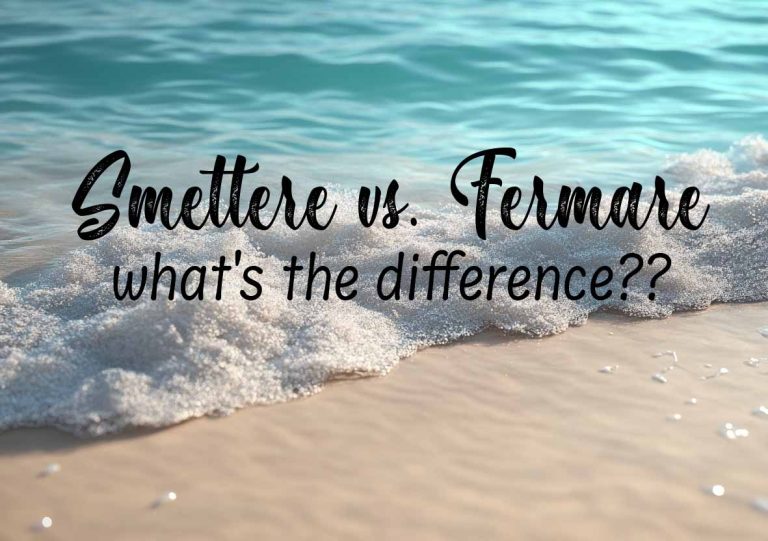
Qual è la differenza tra “Sentire” ed “Ascoltare”?
What’s the difference between “Sentire” and “Ascoltare”?
Quando usare “Sentire” e quando “Ascoltare”?
When to use “Sentire” and when “Ascoltare”?
Spesso queste due parole vengono confuse o usate in modo sbagliato. Esaminiamo insieme queste due frasi che utilizzano i verbi SENTIRE e ASCOLTARE. Quando si usa uno invece dell’altro? Scopriamolo insieme!
These two words are often confused or misused. Let’s examine these two sentences using the verbs SENTIRE and ASCOLTARE. When do we use one instead of the other? Let’s find out!
Il bambino SENTE le onde dell’oceano quando tiene la conchiglia all’orecchio.
The child hears the ocean waves when he holds the seashell to his ear.
Il bambino sulla spiaggia ASCOLTA le onde che si infrangono sulla riva.
The child on the beach listens to the waves crashing on the shore.

Sentire: La percezione involontaria
Sentire: Involuntary Perception
“Sentire” è un verbo generico che indica la percezione di suoni, odori, emozioni o sensazioni fisiche. Questo verbo si riferisce spesso a un’azione involontaria: percepiamo qualcosa senza intenzione specifica.
“Sentire” is a generic verb that indicates the perception of sounds, smells, emotions, or physical sensations. It often refers to an involuntary action: we perceive something without specific intent.
Attraversando la piazza, ho sentito la musica di un chitarrista.
Walking through the piazza, I heard the music of a guitar player.
Sono entrata in cucina e ho sentito il profumo del caffè appena fatto.
I walked into the kitchen and smelled the aroma of freshly made coffee.
Quando mi ha abbracciata, ho sentito una profonda emozione di felicità.
When he hugged me, I felt a deep sense of happiness.


Ascoltare: L’attenzione intenzionale
Ascoltare: Intentional Attention
“Ascoltare” invece implica attenzione e intenzione. Quando ascoltiamo, concentriamo la nostra mente e i nostri sensi su un suono o un messaggio specifico per comprenderlo meglio.
“Ascoltare,” on the other hand, involves attention and intention. When we listen, we focus our mind and senses on a specific sound or message to better understand it.
Ho ascoltato attentamente il chitarrista mentre suonava.
I listened intently to the guitarist as he played his new song.
Ieri sera ho ascoltato la mia canzone preferita per rilassarmi.
Last night, I listened to my favorite song to relax.
Hai ascoltato il messaggio che ho lasciato?
Did you listen to the message I left?

La Matta Parla di Sentire e Ascolatare
Usare “sentire” o “ascoltare” dipende dal livello di attenzione che dedichiamo a ciò che percepiamo. Sentiamo tante cose, ma ascoltiamo solo quelle che catturano la nostra concentrazione!
Using “sentire” or “ascoltare” depends on the level of attention we give to what we perceive. We hear many things, but we only listen to what captures our focus!

Idiomatic Expressions: Sentire
Sentire una voce/rumor
To hear a rumor
Ho sentito dire che stai cambiando lavoro.
I heard that you’re changing jobs.
Ci sono voci che comprerai una nuova casa.
There are rumors that you’ll buy a new house.
Fatti sentire!
Stay in touch or make yourself known!
Fatti sentire più spesso, mi manchi!
Stay in touch more often, I miss you!
Vai alla riunione e fatti sentire!
Go to the meeting and make waves!
Non ti sento da tanto tempo
I haven’t heard from you in a long time
È da tanto che non ti sento!
I haven’t heard from you in ages!
Da quanto tempo non ti fai sentire!
It’s been so long since you’ve reached out!











Molto piacere.
Non mollare Mai da fare quello que fai. Io capisco ma dopo tanti anni senza parlarne me dimentico un poco y asicome stop impara do il inglese approfitto per ricordare il mio italiano e vedere qualcosa di inglese.Grazie per quello que fai.